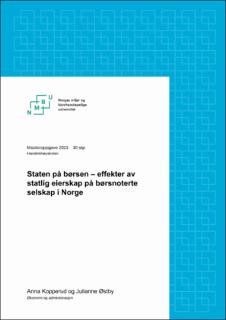| dc.contributor.advisor | Øystein Dahl | |
| dc.contributor.author | Østby, Julianne | |
| dc.contributor.author | Kopperud, Anna | |
| dc.date.accessioned | 2023-07-07T16:27:21Z | |
| dc.date.available | 2023-07-07T16:27:21Z | |
| dc.date.issued | 2023 | |
| dc.identifier | no.nmbu:wiseflow:6839595:54592456 | |
| dc.identifier.uri | https://hdl.handle.net/11250/3077219 | |
| dc.description.abstract | Høsten 2022 la regjeringen Støre ved Nærings- og fiskeridepartementet frem en ny eierskapsmelding, Et grønnere og mer aktivt statlig eierskap – Statens direkte eierskap (Meld. St. 6 (2022–2023)). Den forsterker statens forventninger til blant bærekraft og moderasjon i lederlønninger, og det har skapt reaksjoner i næringsliv og media. Påfølgende diskusjoner gjorde at vi ønsket å se på hvordan staten som aksjeeier påvirker selskaper på Oslo børs. Med problemstillingen Hvilke effekter har statlig eierskap på børsnoterte selskap i Norge? valgte vi ut tre områder for nærmere undersøkelser, Corporate Governance, bærekraft og økonomisk prestasjon.
Vi utforsker problemstillingen både kvalitativt og kvantitativt. Kvalitativt gjennomførte vi ekspertintervjuer med fem informanter – tre fra selskapssiden av statlig eierskap, og to fra Eierskapsavdelingen i Nærings- og fiskeridepartementet. I tillegg analyserte vi ESG-scorer og aksjeavkastning kvantitativt for å undersøke effekter på bærekraft og økonomisk prestasjon.
Informantene er kritiske til statens innblanding i moderering av lederlønninger og frykter dette kan føre til mindre kompetente styrer og ledelser. Forventningen kan påvirke konkurransesituasjonen til selskapene og dermed gå imot statens prinsipper for god eierstyring. Informantene mente at suboptimale styrer og ledelser med en uklar rollefordeling mellom selskap og stat, kan føre til dårlig Corporate Governance.
De børsnoterte selskapene med statlig eierandel har signifikant høyere ESG-score enn resten av selskapene på Oslo børs. I perioden 1. januar 2015 til 1. mars 2023 er avkastningen på aksjene til selskapene med statlig eierandel har ikke signifikant høyere eller lavere på avkastning, men de statlige eide aksjene har en antydning til en mer stabil utvikling og en noe lavere avkastning enn andre selskap. Om prestasjonene på ESG-scorer og avkastning blir påvirket av statlig eierskap, er vanskelig å avgjøre på grunn av lav forklaringsevne fra regresjonsanalysene, samt at informantene deler en oppfatning av at staten i stor grad ikke har noen effekter på dette. | |
| dc.description.abstract | In the fall of 2022 the Norwegian Ministry of Trade, Industry and Fisheries published a new white paper on ownership policy, Greener and more active state ownership – The State’s direct ownership of companies (Meld. St. 6 (2022–2023)) in which the Government’s expectations regarding sustainability and remuneration moderation have been clarified and strengthened/are heightened. The expectations of the State have caused reactions in the media and in the corporate world. This led us to examine how state ownership can affect companies listed on the Oslo Stock Exchange. This thesis addresses the research question What effects does state ownership have on publicly listed companies in Norway? We have examined the impact of state ownership in three areas, corporate governance, sustainability and financial performance.
The research question is explored both qualitatively and quantitatively. Four expert interviews were conducted with five informants – three from the company side of state ownership and two representatives from the Ownership Department in the Ministry of Trade, Industry and Fisheries. In addition, ESG-scores and stock returns were analyzed for effects on sustainability and financial performance.
The informants are critical of the State’s interference regarding moderation of remunerations and fear that this can result in less competent boards and managements. Such expectations may affect the competitive situation of the companies and thus contradict the State’s principles for good Corporate Governance. The informants think that suboptimal boards and managements in addition to an unclear division of roles between the company and the State, can lead to poor Corporate Governance.
The publicly listed companies with state ownership have a significantly higher ESG-score than the other companies on the Oslo Stock Exchange. The companies with state ownership have not performed significantly better or worse in terms of returns from
1 January 2015 to 1 March 2023. Instead, they show a slight tendency to a more stable development and slightly lower returns than the other companies. It is difficult to conclude whether state ownership affects the performance on ESG and returns, due to the low explanatory factor from the regression analysis and the informants’ perception that the State has limited to no influence on these factors. | |
| dc.language | nob | |
| dc.publisher | Norwegian University of Life Sciences | |
| dc.title | Staten på børsen – effekter av statlig eierskap på børsnoterte selskap i Norge | |
| dc.type | Master thesis | |
